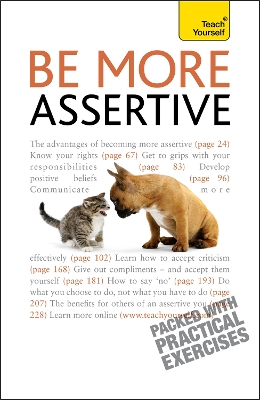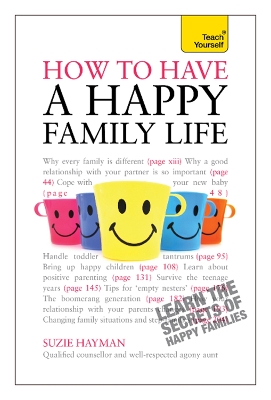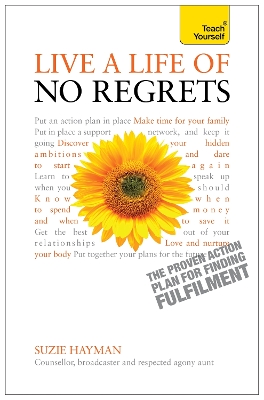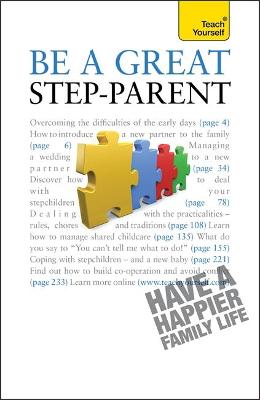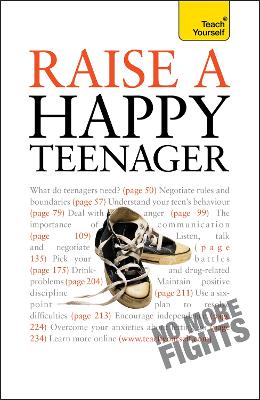Teach Yourself
6 total works
Is this the right book for me?
- do you lack the confidence to say no?
- do you feel that people sometimes take you for granted?
- would you like strategies that will help you communicate your needs openly and calmly?
Teach Yourself Assertiveness will help you if you're struggling to make yourself heard.
It will show you how becoming more assertive can change every part of your life for the better, and give you techniques and strategies to make assertive behaviour a part of your life. You will learn how to give and receive criticism, make and receive compliments, cope with anger, fear and, most importantly, to say 'no' without feeling guilty.
Be More Assertive includes:
Chapter 1: Do you want to be assertive?
Chapter 2: The tactics we use to get along
Chapter 3: Knowing your rights
Chapter 4: Responsibilities
Chapter 5: Beliefs and values
Chapter 6: Becoming assertive
Chapter 7: Accepting and giving criticism
Chapter 8: Accepting and giving compliments
Chapter 9: Saying no
Chapter 10: Getting caught
Chapter 11: Anger and other feelings
Chapter 12: Changing others by changing yourself
Teach Yourself methods:
Not got much time?
One, five and ten-minute introductions to key principles to get you started.
Author insights
Lots of instant help with common problems and quick tips for success, based on the author's many years of experience.
Test yourself
Tests in the book and online to keep track of your progress.
Extend your knowledge
Extra online articles to give you a richer understanding of the subject.
Five things to remember
Quick refreshers to help you remember the key facts.
Try this
Innovative exercises illustrate what you've learnt and how to use it.
Why do some families work better than others? What are the ingredients for a fulfilling family life? In this wide-ranging and practical book, respected counsellor and agony aunt Suzie Hayman explains how you can make your family work, whatever stage of life you are in.
This book is about you and your family - your development, your children's development, your relationships not only with your partner and immediate family but with those who raised you and those you care for and about. We'll be looking at the vital questions; How do children develop? How do families bond? How do our experiences as children help or hinder us later in life? What happens in your family of origin to give you and the best start and continuing opportunities, and how do those influences affect your ability to help your own children go on to thrive and develop? What are the issues that come up in everyday life between you and your family, and how may understanding why you behave and feel the way you do allow you to control what happens, for the best?
No-one has ever said on their deathbed "I wish I'd spent more time at the office". But we all have regrets - losing touch with people, not spending enough time with our family - things that seem insignificant at the time but actually make a huge impact on our wellbeing and other peoples' lives.
In this book, trusted counsellor and agony aunt Suzie Hayman sets out a 7-step action plan for living a life free from regrets and toxic decisions. From making more time for your children to keeping in touch with friends, this book is a roadmap you can follow on both a daily basis and in the long term, making small changes that will dramatically improve the way you feel about your life.
Written by the UK's number one parenting counsellor, Be a Great Step Parent is a practical guide to coping with the many issues faced by the blended family and deriving a positive relationship with your family members. It is full of straightforward and easy-to-follow advice that anyone can act on, with plenty of emotional support for you in times of need. It covers not just all the members of the family involved directly, but also such knock-on issues as grandparents and access. With help for children of all ages, mums and dads, it takes a step-by-step approach to the subject, covering everything from the earliest days of a new relationship to the issues raised by a new baby, with sensible information on finances and schools, and suggestions for stress-free holidays.
NOT GOT MUCH TIME?
One, five and ten-minute introductions to key principles to get you started.
AUTHOR INSIGHTS
Lots of instant help with common problems and quick tips for success, based on the authors' many years of experience.
TEST YOURSELF
Tests in the book and online to keep track of your progress.
EXTEND YOUR KNOWLEDGE
Extra online articles at www.teachyourself.com to give you a richer understanding of PC care.
THINGS TO REMEMBER
Quick refreshers to help you remember the key facts.
Is this the right book for me?
Raise a Happy Teenager: Teach Yourself gives you advice and encouragement to help you manage your child's adolescence and turn these years of conflict into happy, hopeful times. It shows you how to improve communication with your teenager, giving you the insight to tackle all the areas of conflict calmly and confidently, and helping your child become a strong, independent adult.
Written by a leading counsellor who has trained as a teacher and worked with hundreds of teenagers and families like yours, it also offers plenty of real-life stories and sources of further help for anxious or concerned parents.
Raise a Happy Teenager includes:
Chapter 1: The change from child to adolescent
Chapter 2: What do teenagers need?
Chapter 3: Understanding teenage behaviour
Chapter 4: Communication
Chapter 5: Listening and talking, negotiating and compromising
Chapter 6: Whose problem is this?
Chapter 7: Points of conflict
Chapter 8: Helping your teenager to fly
Chapter 9: Looking after yourself
Teach Yourself methods:
Not got much time?
One, five and ten-minute introductions to key principles to get you started.
Author insights
Lots of instant help with common problems and quick tips for success, based on the authors' many years of experience.
Test yourself
Tests in the book and online to keep track of your progress.
Extend your knowledge
Extra online articles to give you richer guidance through your child's teenage years.
Things to remember
Quick refreshers to help you remember the key facts.
Try this
Innovative exercises illustrate what you've learnt and how to use it.
